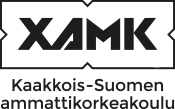International marketing (5 cr)
Code: MR00AF22-3004
General information
Enrollment
16.12.2019 - 10.01.2020
Timing
01.01.2020 - 31.05.2020
Number of ECTS credits allocated
5 op
Virtual portion
3 op
RDI portion
3 op
Mode of delivery
40 % Contact teaching, 60 % Distance learning
Campus
Mikkeli Campus
Teaching languages
- English
Seats
0 - 25
Degree programmes
- Degree Programme in Tourism and Service Business
Teachers
- Natalia Kushcheva
Teacher in charge
Natalia Kushcheva
Groups
-
MRMI18KP
-
MRKT18SMTourism and service business, part-time studies
-
MRMI18SM
Objective
You can: - discuss the importance of marketing abroad - outline the basic principles and design of international marketing - analyze some of the theories underlying international marketing - examine the environments of international marketing - assess foreign market entry strategies and decisions - differentiate between international and domestic product life cycle and the application of this concept in formulating marketing strategies at thedifferent stages of product life cycle
Content
What are the various ways through which companies enter international markets? How investment policies in foreign countries may affect companies going international? How do you evaluate information collected through international marketing research? What are the typical problems encountered in conducting research in international markets and how can you solve them? How can you become aware and understand the complexity and interconnection of the modern tourism and hospitality industry?
Location and time
Class discussions, case studies, group projects, project presentations.
This course could be done totally in online form. Tasks for online studies are given in Moodle course page.
Teaching methods
Scheduled track:
This course provides students with an overview of the hospitality industry along with marketing skills for this very diverse and integrated industry.
This course will present an overview of the marketing challenges faced by organizations in international hospitality environments and provides a framework that can be used to guide international marketing decisions. Emphasis will be placed on the role that marketing managers play in designing marketing strategies to cope with the cultural, social, economic, political, and legal differences found in the international marketplace.
Business cases will be studied to build a framework within which theoretical models can be viewed and applied.
Lectures and class work will be supplemented with field study outings and talks by experienced representatives of tourism and service industry.
Much of the preparation for the exam will rely heavily on the students' serlf notes and readings.
Blended track:
Class discussions, case studies, group projects, project presentations.
This course could be done totally in online form. Tasks for online studies are given in Moodle course page.
Evaluation scale
1-5
Assessment criteria, good (3)
Students can: a. describe how the political, legal, and religious environments are likely to affect firms operating in international markets b. manage appropriate methods of information search to discuss the major advantages and risks likely to be encountered by firms operating internationally c. carry out and formulate measurement standards that can be used to measure and evaluate international marketing performance d. evaluate the characteristics of different media options in international markets and design effective promotional programs e. discuss market research models and identify the most appropriate one which a firm can apply in deciding on a particular mode of entry f. manage and develop team and individual work g. apply the ethical principles to unfamiliar situations in marketing development
Assessment methods and criteria
You are able to:
- outline the basic principles and design of international marketing
- explain the role of travel motivators and destination life cycles
- identify the marketing management and employee positions in an organization and discuss the responsibilities and activities involved with each in achieving the goals of financial profit and guest service
- outline effective quality marketing techniques for people, facilities, products, and economics
- analyze the impact of marketing style on guest services and employee relationships
Assessment criteria, satisfactory (1-2)
Student's graduation-level know-how and skills
a. use professional vocabulary and concepts in different situations
b. limit and justify the use of information sources
c. carry out unfamiliar interrelated tasksfluently
d. work together with customers, users and target groups according to the re-quirements of the situation.
e. apply models, methods, software and techniquesof the professional field and justify their use
f. work in teams in a goal-oriented way
g. apply ethical principles of the professional field in different situations
Assessment criteria, good (3-4)
Student's graduation-level know-how and skills
a. use professional vocabulary and concepts in an expert way in different situations
b. evaluate information sourcescritically
c. work as team members in working life expert duties and identifyand describe the problems of the professional field
d. evaluate operations in customer, user and target group situations
e. choose appropriate models, methods, software and techniques according to the purpose and justify these choices
f. promote teams’ goal-oriented operation
g. apply critically theethical principles of the professional field in different situations
Assessment criteria, excellent (5)
Student's graduation-level know-how and skills
a. professional vocabulary and concepts extensivelyand proficiently in different situations.
b. justify their information sources in a versatile and critical way
c. work innovatively and independently in working life expertduties and creatively identify and solve the problems of the professional field
d. promote and develop operations in customer, user and target group situations
e. evaluate and develop models, methods, software and techniques
f. manage and develop teamoperations
g. promote the application of ethical principles in unfamiliar situations
Qualifications
No prerequisites
